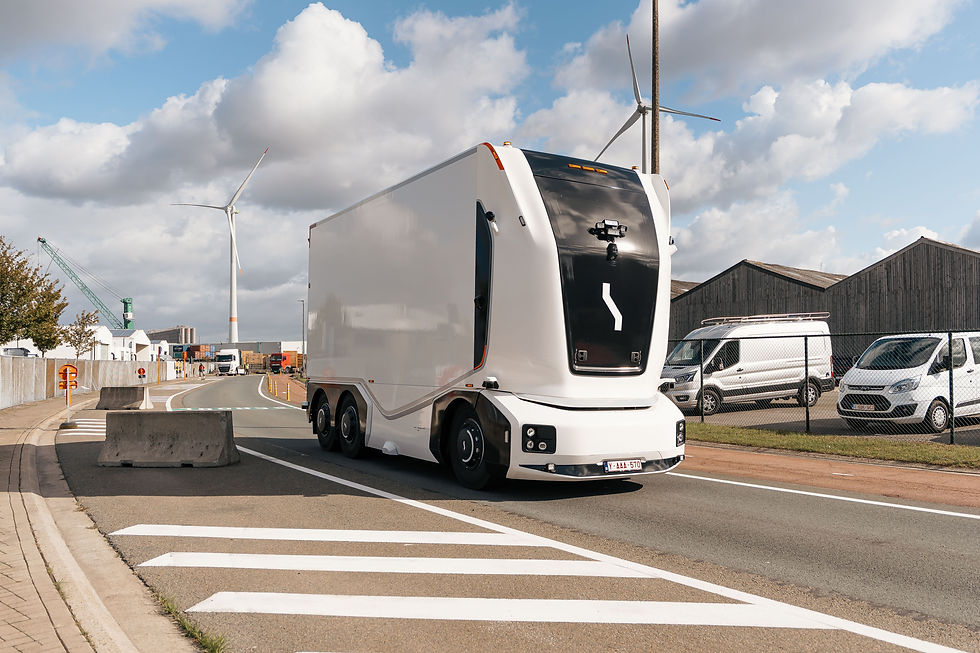Embracing a Smart Future: Autonomous Trucks Gain Traction at European Ports
- gillmcshane
- Sep 17, 2025
- 4 min read
The Port of Antwerp-Bruges has secured a first for Belgium with its inaugural autonomous truck ride, while the UK’s Port of Felixstowe is doubling its autonomous truck fleet as European ports adopt advanced technologies for a smarter, safer and sustainable future.

Ports across the world are increasingly turning to innovative technologies and digitalisation to optimise labour, efficiency, and sustainability.
Automated trucks present an opportunity to overcome driver shortages and to embrace reduced emissions, improved road safety, and fewer traffic jams through more efficient driving.
The Port of Felixstowe – the UK’s largest and busiest container port – is set to double to 68 its groundbreaking fleet of autonomous trucks, marking the largest deployment of such vehicles in European port operations.
Cementing its position as a leader in port automation, Hutchinson Ports-owned Port of Felixstowe confirmed in a press release that it has ordered a further 34 Autonomous Trucks (ATs) from Shanghai Westwell Technology (Westwell).
The port operator said the first 34 ATs, which were deployed successfully earlier this year at its Trinity Terminal alongside conventionally driven trucks, represented Europe’s “first ever successful use of ATs in mixed traffic mode operation”.
Clemence Cheng, Executive Director of Hutchison Ports and Port of Felixstowe CEO, commented: “We are proud to be leading the way in autonomous operations in ports. Doubling our fleet of ATs will deliver even greater efficiency and resilience to our operation. These new units will feature enhanced sensor technology, enabling even greater operational performance for our customers.”
The port’s ATs are equipped with cutting-edge technology, including 128-line LiDAR, 360-degree camera vision, monocular and stereo cameras with radar, delivering world-class levels of safety and performance.
A newly commissioned automated battery swap station allows the ATs to exchange depleted power units for fully charged ones in just five to six minutes – without manual intervention. This ensures maximum fleet availability and minimal disruption to operations.
As well as improving operational consistency and efficiency, the increased use of battery-powered ATs will significantly support the Port of Felixstowe’s ambition to achieve Net-Zero for Scope 1 and 2 emissions by 2035.
The expansion of the project has been made possible thanks to the recent introduction of a private 5G network at the Port of Felixstowe – reportedly one of the largest private networks of its kind in the UK.
Belgium’s First-Ever Autonomous Truck Ride with Einride

This week the Port of Antwerp-Bruges celebrated the first time a fully autonomous heavy-duty truck has taken to public roads in Belgium thanks to a demonstration by Einride.
Years of data collection have allowed Einride to roll out its autonomous technology on a large scale, following successful applications in Sweden and the US, according to a press release from the Port of Antwerp-Bruges.
The cab-free design of the truck allows one operator to monitor multiple vehicles, opening up new prospects for cost-effective and safer transportation. While the vehicle operates fully autonomously using a combination of radar, LIDAR, and camera technology for a 360° view, Einride applies an AI-powered control tower to monitor the transport operations and assist if needed.
The demo took place during the first ‘Port of the Future – Autonomous Summit’, which brought together technology companies, port operators and policy-makers to showcase the future of transportation in ports via the latest applications, from drones and vessels to container shuttles and trains.
Henrik Green, CTO and General Manager for Einride Autonomous Technologie, commented: “Now in our second European country, Einride continues to demonstrate success in securing permits and achieving first-of-their-kind deployments. Today in Antwerp, we showcase how public and private sectors can come together toward shared goals.”
Green continued: “European Ports, such as Antwerp-Bruges, are essential for decarbonising logistics and secure our supply chains; and with the European Commission acknowledging autonomous vehicles as key to EU competitiveness, we’re proud to showcase a clear example of how innovation and regulation can be balanced for safer, more efficient and sustainable logistics.”
Describing itself as a “port of the future”, the Port of Antwerp-Bruges claims to be fully committed to autonomous mobility on the land, at sea and in the air. As such it is developing an ecosystem where autonomous technology can be tested and made scalable.
“Antwerp is much more than a logistics hub; it is also a place where the mobility of tomorrow is tested and refined,” pointed out Johan Klaps, Vice Mayor for the Port and Economy City of Antwerp / President of the board Port of Antwerp-Bruges. “Autonomous and sustainable applications like Einride's prove that innovation here is not optional, but an engine for competitiveness and economic growth.”
As one of the most complex logistics hubs in the world, already the port has tested a number of innovative applications such as drones for inspection and monitoring, unmanned and semi-unmanned vessels, and remotely piloted cars.
The Port of Antwerp-Bruges says these autonomous systems ensure smoother goods flows, shorter waiting times and greater safety by reducing people's exposure to risky or repetitive tasks. At the same time, they make an important contribution to climate ambitions by reducing emissions and using resources more efficiently.






Comments